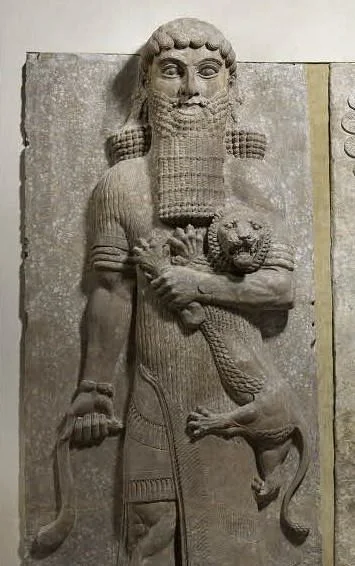Lucy Worsley, one of my favourite television personalities, recently presented the life of Agatha Christie. In her old age, when Christie was planning her funeral, she considered having Edward Elgar's Nimrod performed. Nimrod is a deeply moving memorial for Elgar's friend and business associate Augustus Jaegar; coincidentally, it was at Nimrod in Iraq, that Agatha Christie met her future husband, Max Mallowan. Similar to Gilgamesh's grief when his friend Enkidu died, Elgar experienced grief and despair when Jaegar died, this music is an expression of these deeply felt emotions. Nimrod is associated with Gilgamesh, so this music had a deeper and synchronistic meaning for Christie who accompanied her husband on the various archaeological digs at Nimrod. Coincidentally, Nimrod is also a biblical king, and some scholars associate (apparently wrongly) Nimrod with Gilgamesh. The grief of losing a close friend—an ally, a companion—is as though to lose a part of one’s own being; as Gilgamesh grieves for Enkidu, as Elgar grieves for Jaegar, as Max would grieve for Agatha upon her death.
-o-
Gilgamesh's loss of Enkidu also reminds me of John Milton's poem, "Lycidas", an elegy written after the loss of Milton’s close friend, Edward King, who died by drowning; death is certainly a cause for questioning life and one's place in life. There is a meeting and connection of souls between Gilgamesh and Enkidu; when Enkidu dies, part of Gilgamesh's inner being is also lost; but what will Gilgamesh do about it? Milton's father, well-meaning and supportive of his son's poetry, thought writing about the death of Lycidas was a poor choice of subject matter for his son, but Milton was driven by what the soul demanded and in writing poetry this is of greater importance than anything else. In "Lycidas" Milton reflects something of Gilgamesh's loss.
Milton writes:
For Lycidas is dead, dead ere his prime
Young Lycidas, and hath not left his peer;
Who would not sing for Lycidas? he well knew
Himself to sing, and build the lofty rime.
He must not flote upon his watry bear
Unwept, and welter to the parching wind
Without the meed of som melodious tear.
And, at the poem's end, he writes"
Now Lycidas, the shepherd's weep no more;
Henceforth thou art the Genius of the shoar
In thy large recompense, and shalt be good
To all that wander in that perilous flood.
. . . . .
And now the Sun had stretcht out all the hills,
And now was dropt into the western bay;
At last he rose and twitcht his mantle blew:
To morrow to fresh woods and pastures new.
-o-
I remember studying Tennyson's poem, "In Memoriam A.H.H.", at university; it is one of the great poems of the Victorian era, a greater poem than I realized when I first read it. "In Memoriam A.H.H." has a thematic connection to Gilgamesh in that both texts are written out of grief for a deceased friend. Like Milton’s "Lycidas" it is an elegy; it took Tennyson almost twenty years to write and publish "In Memoriam A.H.H.", a poem that memorializes Tennyson's friend, Arthur Henry Hallam. It is grief over the loss of a loved one that Gilgamesh, Milton, and Tennyson experienced. And while these poems are expressions of grief they are also means of going beyond grief; alas*, grief has its own schedule, one that may require acceptance of things as they are and living with grief. Here, I must also emphasize the importance of writing poetry, and reading poetry, as healing; "In Memoriam" is a kind of confessional poem but written long before the invention of confessional poetry by Robert Lowell; writing this poem, and reading it, was a healing experience. “In Memoriam” was Queen Victoria's favourite poem, in it she found solace and consolation from grief after the death of her much loved husband, Prince Consort Albert. This is why poetry is not "writing", it has a greater importance than mere writing; the best poetry is, as Keats understood, soul work, it is the archaeology of the soul, it is to see “the Deep”. Tennyson writes,
CVI
Ring out, wild bells, to the wild sky,
The flying cloud, the frosty light:
The year is dying in the night;
Ring out, wild bells, and let him die.
Ring out the old, ring in the new,
Ring, happy bells, across the snow:
The year is going, let him go;
Ring out the false, ring in the true.
Ring out the grief that saps the mind,
For those that here we see no more;
Ring out the feud of rich and poor,
Ring in redress to all mankind.
Ring out a slowly dying cause,
And ancient forms of party strife;
Ring in the nobler modes of life,
With sweeter manners, purer laws.
Ring out the want, the care, the sin,
The faithless coldness of the times;
Ring out, ring out my mournful rhymes,
But ring the fuller minstrel in.
Ring out false pride in place and blood,
The civic slander and the spite;
Ring in the love of truth and right,
Ring in the common love of good.
Ring out old shapes of foul disease;
Ring out the narrowing lust of gold;
Ring out the thousand wars of old,
Ring in the thousand years of peace.
Ring in the valiant man and free,
The larger heart, the kindlier hand;
Ring out the darkness of the land,
Ring in the Christ that is to be.
-o-
Note: revised on 29 December 2025.







.JPG)